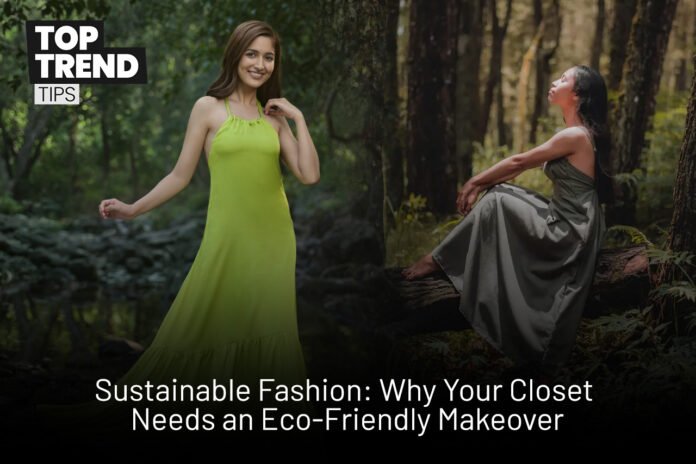Sustainable Fashion Why Your Closet Needs an Eco-Friendly Makeover
Sustainable fashion is more than just a trend; it’s a movement towards a more responsible and ethical way of dressing. As our awareness of environmental and social issues grows, so does the importance of making conscious choices about what we wear. Let’s explore why your closet needs an eco-friendly makeover and how you can make the transition to sustainable fashion.
What is Sustainable Fashion?
Defining Sustainable Fashion
Sustainable fashion refers to clothing, shoes, and accessories that are produced in a way that is environmentally and socially responsible. This means considering the entire lifecycle of a product, from design and production to disposal.
Key Principles of Sustainability in Fashion
The main principles include using eco-friendly materials, reducing waste, conserving water, ensuring fair labor practices, and creating durable products that last.
The Impact of Fast Fashion
Fast fashion is the opposite of sustainable fashion. It focuses on rapid production and consumption, often at the expense of the environment and workers’ rights.
Environmental Consequences
Fast fashion contributes to pollution, excessive water usage, and massive waste. The constant production and disposal of clothing lead to significant carbon emissions.
Social Implications
Fast fashion often relies on cheap labor in poor working conditions. Workers in these industries may face low wages, long hours, and unsafe environments.
Benefits of an Eco-Friendly Closet
Environmental Benefits
Reducing Carbon Footprint
Sustainable fashion reduces the carbon footprint of your wardrobe by using eco-friendly materials and production methods.
Minimizing Waste and Pollution
Eco-friendly fashion practices minimize waste by encouraging recycling and the use of biodegradable materials.
Social Benefits
Ethical Labor Practices
Supporting sustainable fashion means advocating for fair wages and safe working conditions for workers around the globe.
Supporting Local Communities
Many sustainable brands work with local artisans, helping to preserve traditional crafts and support local economies.
Personal Benefits
Healthier Materials
Sustainable fashion often uses natural and non-toxic materials, which are better for your skin and overall health.
Quality Over Quantity
Sustainable pieces are typically higher quality and more durable, meaning you’ll get more wear out of them over time.
How to Transition to a Sustainable Wardrobe
Assess Your Current Wardrobe
Identifying Unsustainable Items
Start by evaluating what you currently own and identify items that are made from non-eco-friendly materials or by fast fashion brands.
Decluttering Responsibly
Declutter your wardrobe by donating, selling, or recycling items you no longer need rather than throwing them away.
Building a Sustainable Wardrobe
Choosing Sustainable Brands
Research and support brands that prioritize sustainability in their production processes.
Investing in Timeless Pieces
Focus on purchasing timeless, versatile pieces that won’t go out of style quickly.
Maintaining a Sustainable Wardrobe
Caring for Your Clothes
Properly caring for your clothes extends their lifespan, reducing the need for frequent replacements.
Repairing and Upcycling
Learn to repair or upcycle your clothing to give them a new life instead of discarding them.
Sustainable Fashion on a Budget
Thrift Shopping and Secondhand Stores
Thrift shopping is a budget-friendly way to find unique, sustainable pieces.
DIY and Upcycling Projects
Get creative with DIY projects to transform old clothes into something new and stylish.
Swap Events and Clothing Exchanges
Participate in clothing swaps or exchanges to refresh your wardrobe without spending money.
Common Misconceptions About Sustainable Fashion
It’s Too Expensive
While some sustainable brands can be pricey, there are plenty of affordable options available, especially secondhand and thrift stores.
Limited Style Options
Sustainable fashion is diverse and includes a wide range of styles to suit any taste.
It’s Hard to Find
With the rise of online shopping and dedicated sustainable fashion marketplaces, finding eco-friendly clothing has never been easier.
The Future of Sustainable Fashion
Innovations in Sustainable Materials
From organic cotton to recycled fabrics, innovation in materials is paving the way for a more sustainable fashion industry.
The Role of Technology
Technology is playing a crucial role in making fashion more sustainable, from advanced recycling processes to digital fashion design.
Consumer Trends and Awareness
As more consumers demand sustainable options, the industry is responding with increased transparency and better practices.
Conclusion
Sustainable fashion is about making mindful choices that benefit both people and the planet. By transitioning to an eco-friendly wardrobe, you can reduce your environmental impact, support ethical labor practices, and enjoy high-quality, stylish clothing. Start your sustainable fashion journey today and make a positive difference with every outfit you wear.
FAQs
Q1: What are some affordable sustainable fashion brands?
Many affordable brands, such as Everlane, Pact, and People Tree, offer stylish and eco-friendly options.
Q2: How can I tell if a brand is truly sustainable?
Look for certifications like Fair Trade, GOTS, and B Corp, and research the brand’s practices and transparency reports.
Q3: Are there any sustainable fashion certifications to look for?
Yes, certifications like Global Organic Textile Standard (GOTS), Fair Trade, and OEKO-TEX are good indicators of sustainability.
Q4: How can I make my current wardrobe more sustainable?
Start by caring for your clothes properly, repairing items instead of discarding them, and being mindful of future purchases.
Q5: What are some easy DIY projects to upcycle old clothes?
Try turning old t-shirts into tote bags, jeans into shorts, or adding patches and embroidery to worn-out items.



